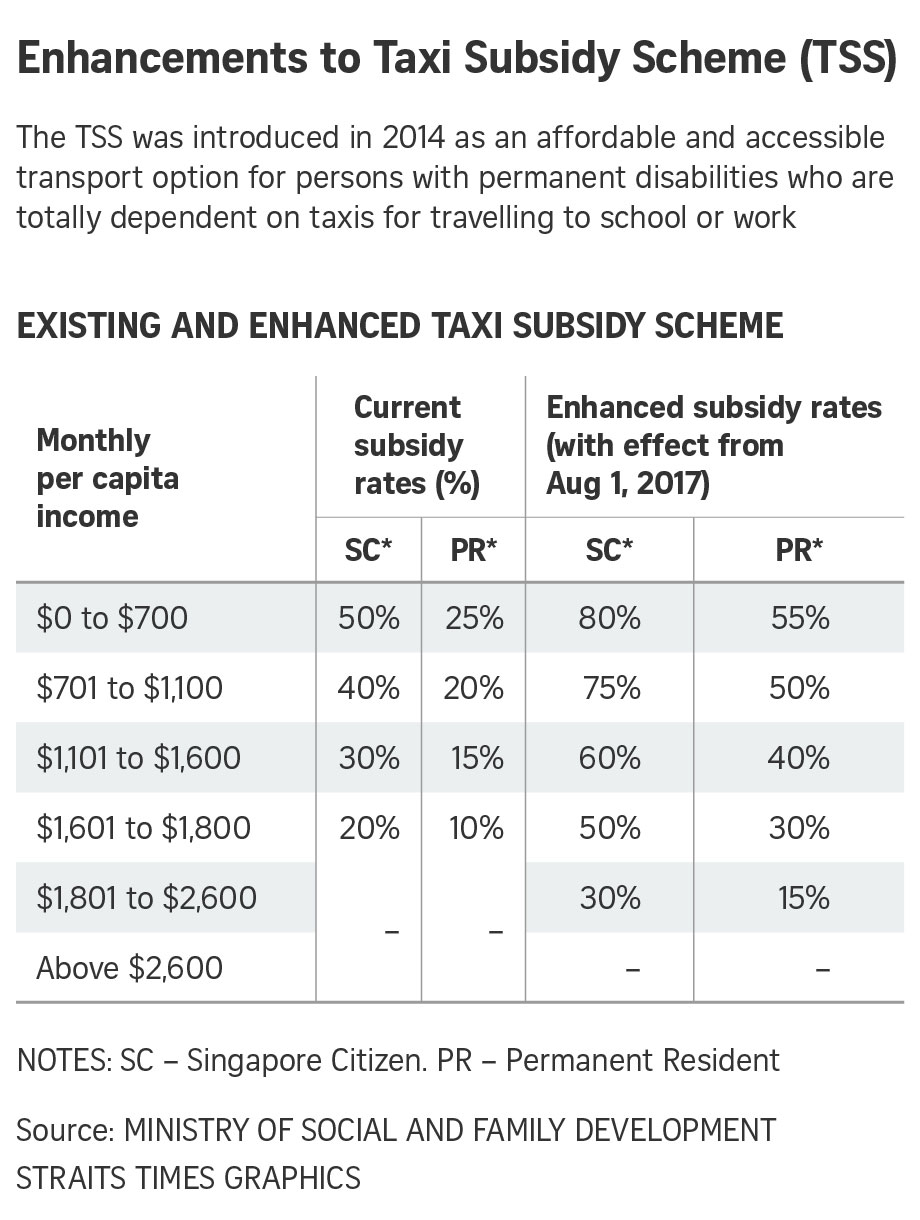SINGAPORE - People with disabilities can benefit from cheaper taxi rides, as well as better availability of accessible parking lots, with tighter rules on the categories of disabled drivers and caregivers who can park their cars in these spaces.
The Ministry of Social and Family Development (MSF) said on Thursday (July 27) that it is beefing up the taxi subsidy scheme and car park label scheme, which caters to people with disabilities.
From Aug 1, households with a monthly per capita income of up to $2,600 can tap on taxi subsidies of up to 80 per cent, depending on their income tier. This is up from the current parameter of $1,800 per capita monthly household income. With the higher income cap, more people are likely to qualify for the scheme as well.
Singaporeans and permanent residents are eligible for the scheme. They have to also be medically certified as unable to take public transport or completely dependent on cabs for travelling to school or work.
The taxi subsidy scheme was introduced in 2014 to provide subsidies of up to 50 per cent to people with disabilities.
Ms Ivy Seah, 53, an assistant transport executive at Handicaps Welfare Association, said: "Taxi fares can be very expensive. This helps to offset the cost, especially since many of our clients have incomes on the lower-end of the scale." She added that their clients with disabilities normally do receptionist or clerical work due to their limited mobility.
With this new scheme, Mr Lim Eng Whatt, a 67-year-old leading customer service agent in F&B services, will save about $500 on taxi fares. Previously, he paid about $1,440 for cab fares per quarter, after the subsidies. The new scheme will reduce this amount to $900.
"I'm very happy with this change. Almost half of my take-home salary goes to taxi fares before subsidies, and even with the subsidies I have now, I still have little money after paying for my basic necessities. This increased subsidy will help pay for my transport," Mr Lim said.
The taxi scheme will also be extended to those attending employment-related training supported by disability services and support organisation SG Enable. It will also cover LTA-registered private hire cars under third-party private hire car booking service providers like Grab and Uber.
MSF is also updating the car park label scheme, which currently allows disabled drivers to park in accessible lots by displaying a blue label. Caregivers of the disabled get an orange label which allows them to park in accessible lots for an hour.
Under the current scheme, people with crutches, quad-sticks and wheelchairs or walking frames and lower-limb prosthetics are eligible for the label.
However, from November this year, only people with wheelchairs, walking frames and lower-limb prosthetics will be eligible to apply for labels, as they will need the accessible lot space to board or alight from their vehicle.
To prevent indiscriminate use of the lots, the design of the carpark labels have also been changed. The labels are now larger with clearer and bigger fonts. They also have a tamper-proof hologram.
These changes will help to combat the problem of people misusing labels, as highlighted by Dr Marissa Medjeral-Mills, executive director at Disabled People's Association.
"Sometimes caregivers use the accessible lot even when they're not carrying a disabled passenger. Other times, drivers without the labels at all use the lot for their own convenience," she said.
"What we require is growing awareness among the public on the labels and their proper usage. We need to nurture growing citizen support for each other."
Over the last five years, car park label holders have increased by about 30 per cent, due to an ageing population and growing numbers of the elderly with disabilities.
Ms Ainon Abdul Rahman, 58, a receptionist who suffers from polio, agreed that the carpark labels are helpful, but also felt that more needed to be done to enforce the proper usage of accessible lots.
"Sometimes I find someone parking in the lot without the label and I need to drive round and round until the person drives away or I find another lot," she said. "There is not enough space in a normal lot for me to open my wheelchair."
The new labels will be issued from mid-August for new applicants and existing label holders. They will need to display the new labels from November 2017.
From Jan 2018, vehicles without a valid car park label and caregivers with the orange label who park for more than an hour in an accessible lot will be fined $200. For repeat offenders, heavier fines of up to $400 may be imposed and the vehicle may be towed away.




